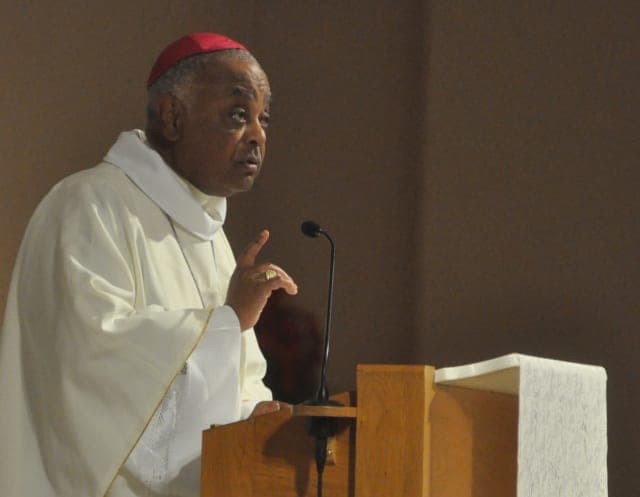INDIANAPOLIS — Atlanta Archbishop Wilton D. Gregory said June 14 the U.S. Catholic bishops “can never say that we are sorry enough for the share that we have had in this tragedy of broken fidelity and trust” — the clergy sex abuse crisis.
He made the comments in the homily at an evening Mass said to commemorate a “Day of Prayer and Penance” for victims of sexual abuse within the Catholic Church. The liturgy was celebrated at SS. Peter and Paul Cathedral in Indianapolis at the end of the first day of the bishops’ spring assembly.
“At this Mass, we bishops humbly and sincerely ask for the forgiveness of those who have been harmed, scandalized or dispirited by events that, even if they happened many years ago, remain ongoing sources of anguish for them and for those who love them,” he said.
“We bishops have learned a great deal about the sorrow and pain of those we love and serve, even as we have to acknowledge humbly, publicly and pitifully our share in bringing much of that pain to bear,” Gregory said.
Pope Francis has summoned the bishops of the Catholic Church, he said, “to find occasions and opportunities to pray earnestly for God’s grace to bring about the healing and the reconciliation of those who have been harmed in this tragedy that has hurt far too many of his people and far too much of his church.
“The Holy Father has called us respectfully to acknowledge our own share in causing the pain that so many are still enduring,” he said.
“At this Mass,” Gregory continued, “we bishops humbly and sincerely ask for the forgiveness of those who have been harmed, scandalized or dispirited by events that, even if they happened many years ago, remain ongoing sources of anguish for them and for those who love them.”
The bishops “humbly seek forgiveness from the faith-filled people of our church and from our society at-large,” he said. But, he continued, they especially seek forgiveness “from those whose lives may have been devastated by our failure to care adequately for the little ones entrusted to us and for any decision that we made or should have made that exacerbated the sorrow and heartache that the entire church has felt and continues to feel — for what we have done, and for what we have failed to do.”
Gregory noted that the U.S. bishops have put many procedures in place to address the sex abuse crisis in the 15 years since they first approved the “Charter for the Protection of Children and Young People.”
The charter emphasizes that the first obligation of the church toward victims of sexual abuse is to offer outreach and provide a path toward healing and reconciliation. The document also put in place a system for auditing how dioceses are complying with the charter and implementing procedures to address abuse cases and prevent abuse.
The bishops also created the Secretariat for Child and Youth Protection and established the National Review Board, which oversees the audits.
These “procedural and educational expressions of our commitment to reform and renewal … are sincere, state-of-the-art and effective,” Gregory said.
“Nevertheless, this expression of our sorrow,” he said, referring to the special Mass, “is far more important at this time, in this place, than any administrative process or training effort, however beneficial to the church and to the world.”
At the end of Mass, all the bishops knelt and recited a Prayer of Healing and Reconciliation.















